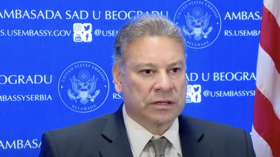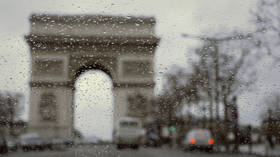Serbia promised riches for abandoning Kosovo

The sooner Serbia recognizes Kosovo’s independence, the faster they can both reunite in the prosperous embrace of the EU, in which the former Yugoslavia will power the continent’s entire economy, the US envoy for the Balkans, Gabriel Escobar, said on Friday in an interview with a local CNN affiliate.
“I think we have to move away from the narrative that Kosovo is Serbia, and move toward the narrative that Kosovo and Serbia are Europe,” Escobar told N1 TV at the US embassy in Belgrade.
“You have a common future, and that future is moving rapidly away from the problems of the 1990s and quickly to the opportunities of the 21st century,” he added.
In this future, the remnants of Yugoslavia will become the “driver of growth for Europe, for the entire continent,” Escobar explained, a center for renewable energy production, information technology, shipping and transportation.
“So the reality is that, eventually, you’re all going to be linked anyway,” starting through some regional economic arrangements such as the “Open Balkans” initiative, and “eventually through the European Union. The quicker we can resolve some of these issues, the quicker we can get to this future of opportunity,” the US envoy concluded.
Escobar was in Belgrade to meet with Serbian President Aleksandar Vucic and EU negotiator Miroslav Lajcak. He acknowledged the US is “not a participant” but “support the dialogue” between Serbia and Kosovo mediated by the EU.
Earlier in the week, he met with Kosovo’s acting president, Vjosa Osmani, whose office was decorated with a flag of “Dardania” – a political project of uniting all the lands in the Balkans claimed by ethnic Albanians into one state.
The latest round of shuttle diplomacy came ahead of September 1, the deadline set by authorities in the breakaway Serbian province for getting rid of Serbian license plates and identification documents for ethnic Serbs living in the north of Kosovo. Pristina’s move to impose the measures at the end of July triggered local protests and barricades on the roads, with Belgrade vowing to act to stop “another pogrom.” After several tense hours, Kosovo Prime Minister Albin Kurti decided to “postpone” the move at the urging of the US envoy in Pristina.
EU police and NATO peacekeepers have since been deployed in strength in northern Kosovo municipalities where ethnic Serbs are a majority, vowing to stop any barricades or protests – but not the ethnic Albanian government’s confiscation of documents.
NATO occupied Kosovo in 1999, after a 78-day air war against what was then Yugoslavia. The province of Serbia declared independence in 2008, with Western support. While the US and most of its allies have recognized it, Serbia, Russia, China and the UN in general have not.













